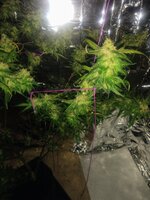The "organic" growers certainly do

.
But that's being just a bit unfair to them...
It may be, to some extent.
Well, there
is, sometimes. It used to be, "There is,
always."
A couple of things: There are many different varieties of fruits, vegetables... and cannabis. A lot of what ends up on grocers' shelves isn't grown for taste, or even nutritional value - its grown because the variety handles being through the whole process of making its way from the farm to that grocery store shelf better than other varieties. Or because it'll stay "good" longer while sitting on that shelf awaiting sale and/or in the purchaser's kitchen, awaiting consumption. Or both. So most of the grocery store produce is going to come in a distant second place in comparison to some home-grown produce. I stated "some" because, again, there are many varieties... Some people decide to grow their own food - and then end up growing many of the same varieties found in stores because it's what they're used to, they recognize the variety's (strain's) name, etc.
Anyway, then along came "hydroponically-grown produce." Much of it had the same issues as above. Also, it wasn't grown very well, IMHO. It's a business, and profit is in production. Produce many fruits (etc.), and do so as cheaply as possible. Therefore, things that might contribute to flavor but which are not absolutely necessary to produce a fruit might get skipped. <SHRUGS> It's like growing cannabis. You can grow cannabis well - or you can just "grow cannabis."
And people were still learning how to do the job, so to speak. And... well, learning in a commercial environment has a tendency to
cost money 
. If you know that (pulling numbers out of the air, here) you can produce 15,000 tomatoes, and it'll cost you $1,000... And that, if you do some experimenting, you might end up producing 8,000 tomatoes for the same $1,000 (or maybe even more), are you going to do it? That's not a hobby, that's your paycheck.
However, some people have been experimenting, and have been learning. People have already learned that adding a salt (I think it's sodium chloride - like you find in your salt shaker) in small doses at a certain point in the plant's life, that they end up with better tasting tomatoes. There are some other things (which I don't recall, but would probably try to read up on if I decided to grow tomatoes hydroponically) that they've learned, that also improve the taste.
Can some people still notice the difference between a (well-grown) hydroponic tomato and one grown in soil? Undoubtedly.
Some people can identify whether the music they're hearing is being played through a pair of $1,500 speakers or a pair of $30,000 ones, ten times out of ten, lol.
It's the same with cannabis. If your taste buds are "dead," you might not be able to discern a difference even when that difference is... somewhat extreme. Many might not notice the difference when both sets were grown with care. Some will probably be able to tell in a blind test, repeatedly.
And then someone comes out with a strain that smells like dog sh!t and it doesn't really matter

...
Er, sorry. I have been wondering if some of the "tricks" that the fruit/vegetable/etc. growers have learned in recent years might be applicable to the hydroponic cannabis garden.
Another thing to remember is that the growing isn't the entire story. There's deciding
when to harvest, the method of drying (and how long it takes), and that whole curing thing. A person can manage to ruin the... "presentation" (for lack of a better term) of even the best-grown cannabis on the planet. . . .




 .
. . If you know that (pulling numbers out of the air, here) you can produce 15,000 tomatoes, and it'll cost you $1,000... And that, if you do some experimenting, you might end up producing 8,000 tomatoes for the same $1,000 (or maybe even more), are you going to do it? That's not a hobby, that's your paycheck.
. If you know that (pulling numbers out of the air, here) you can produce 15,000 tomatoes, and it'll cost you $1,000... And that, if you do some experimenting, you might end up producing 8,000 tomatoes for the same $1,000 (or maybe even more), are you going to do it? That's not a hobby, that's your paycheck. 

 (IL becomes a decent option in January to bide some time though.)
(IL becomes a decent option in January to bide some time though.)